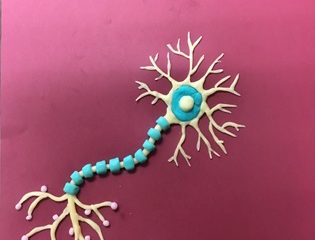First off, I typically don’t blog on political topics, having been taught as a child that there are three topics that you don’t discuss with people you don’t know well: politics, religion, and money. That being said, this is a big election year, so it just seems negligent to avoid the topic altogether.
Over the past few years, more psychologists have turned their attention to questions about why we hold the political attitudes we do. In a recent entry, Jaime Napier and John Jost published a series of experiments that conclude that conservatives are happier than liberals, not just in the United States, but in nine other nations as well [1].

The Conservative Brain?
The difference in happiness remains after controlling for demographic variables. The authors argue that the main variable accounting for this discrepancy is that conservatives are less bothered by the inequality they see around them than liberals. As financial inequality grew from 1974 to 2004, so did the “happiness gap.” The authors argue that conservatives’ ability to rationalize the status quo as “fair” protects them from the unhappiness experienced by the liberals.
Somehow, this paper just doesn’t seem connected to the work on happiness by Ed Diener (who is quite liberal and an apparently very happy man) and others in the positive psychology field. You can take a version of Diener’s happiness measure here. This literature focuses on social relationships, quality of work, progress towards goals, spirituality, and self esteem. Nowhere in my reading do I see “how do I feel about the social inequality around me” as a major variable in personal happiness.
So why do I think conservatives are happier than liberals? Perhaps one clue comes from Jack and Jeanne Block (2006), who looked at characteristics of their preschoolers who later affiliated with either conservatism or liberalism [2]. If you can read past the obvious disgust with which the Blocks hold conservatives (an all-too-common and unfortunate trend in the psychological literature on politicial orientation), an interesting difference in self-control emerges. As preschoolers, the future conservatives tilt towards “over-control,” while the future liberals tilt towards “under-control.” Both extremes have their own sets of drawbacks, but the worst outcome you get from “over-control” is being rather bland and boring. In contrast, people who are “under-controlled” are going to be at risk for a number of self-destructive behavior patterns that are not exactly conducive to happiness.
1. Napier, J.L., & Jost, J.T. (2008). Why are conservatives happier than liberals? Psychological Science, 19 (6), 565-572.
2. Block, J., & Block, J.H. (2006). Nursery school personality and political orientation two decades later. Journal of Research in Personality, 40 (5), 734-749.



4 Comments
C_Ritter · October 8, 2008 at 7:54 pm
I would have to agree that conservatives are not more optimistic because they are less bothered by inequality around them. I have quite an even split in my extended family between conservatives and liberals (which makes for some very “fun” family reunions). I’ve noticed that many of the conservatives in my family are quite bothered by inequality they notice surrounding themselves (as evidenced by their community service, political activism, etc.). I would actually say that my liberal relatives are more hopeful for the future (even with the financial crisis looming) than my conservative relatives. The conservatives in my family are by far more pessimistic about our country’s outlook for the future. They seem to be generally negative about most things, so that follows suit (they just aren’t happy/content people).
Laura’s Psychology Blog » Fraidy-cat conservatives and bold liberals? · September 19, 2008 at 2:34 pm
[…] our tribute to the psychology of political attitudes, which we started with a discussion of the “happiness gap” between conservatives and liberals, is today’s entry–an article appearing in the prestigious journal Science that claims […]
Laura’s Psychology Blog » Optimism and Presidential Elections · October 3, 2008 at 11:07 am
[…] between the candidates is representative of their followers, it might help explain the “happiness gap” we discussed in an earlier post, and it is certainly consistent with the optimism […]
Laura’s Psychology Blog » More on the Happiness Gap Between Conservatives and Liberals · October 30, 2008 at 5:33 pm
[…] reported previously that the Happiness Gap between conservatives and liberals world-wide was continuing to grow, and […]
Comments are closed.